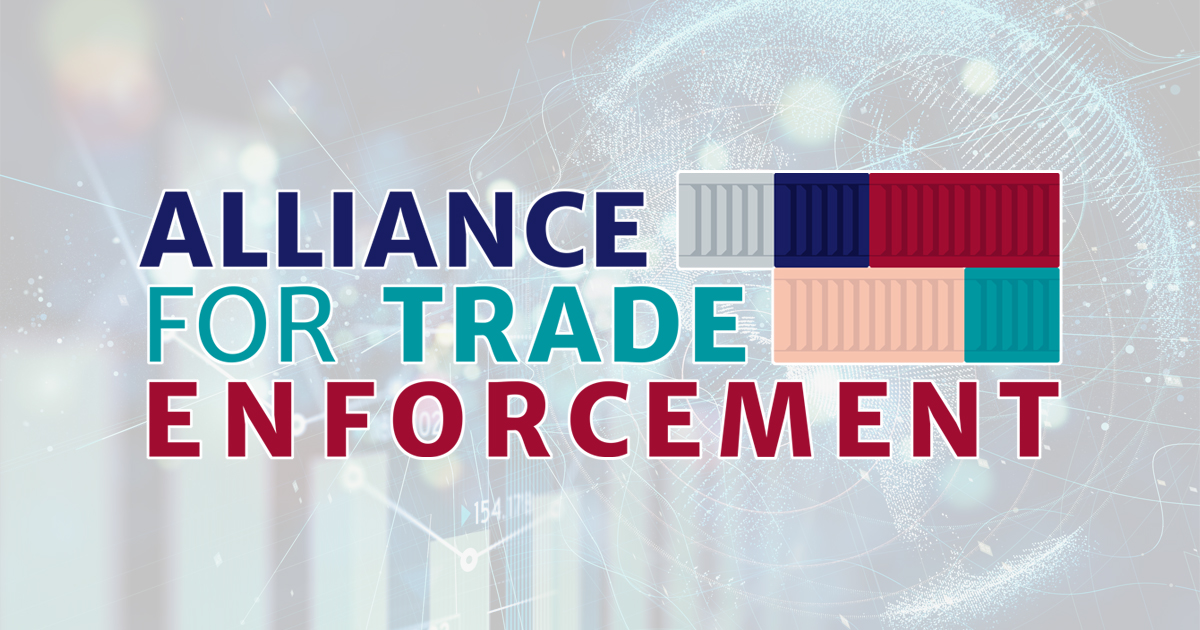Welcome to
Remedies: The Trade Enforcement Digest,
a monthly newsletter brought to you by the Alliance for Trade Enforcement (AFTE).
AFTE is a coalition of trade associations and business groups that advocates for protecting American businesses and workers by enforcing U.S. trade agreements.
|
|
|
|
Would you like to speak with an AFTE representative about any of the issues discussed in this newsletter?
If so, please email contact@enforcementalliance.org.
|
|
-
NEW U.S.-TAIWAN TRADE TALKS: The Biden administration announced the launch of U.S.-Taiwan trade initiative negotiations. The announcement came soon after Taiwan was not included in the IPEF initiative. (Reuters, 6/1)
-
OP-ED - TRIPS WAIVER WOULD UNDERMINE WTO CREDIBILITY: Former Deputy U.S. Trade Representative and U.S. Ambassador to the World Trade Organization Dennis Shea penned an op-ed arguing that the proposed TRIPS waiver actually undercuts the WTO while doing nothing to improve global vaccine access. He suggests several trade-related measures the WTO could take to enhance vaccine equity. (RealClearPolicy, 5/24)
-
IPEF NEGOTIATIONS START: President Joe Biden formally launched negotiations for the Indo-Pacific Economic Framework (IPEF) with 12 initial member countries, which when combined with the United States represent 40% of the world's GDP: Australia, Brunei, India, Indonesia, Japan, Republic of Korea, Malaysia, New Zealand, the Philippines, Singapore, Thailand, and Vietnam. Subsequently, the White House added Fiji to the roster, bringing the total number of member countries to 13. The framework will include four key pillars to deepen U.S. economic engagement in the region, including a trade pillar. (White House, 5/23) (Reuters, 5/26)
-
SENATE CALLS FOR STANDARD CONSULT W/ USTR: Senators Ron Wyden (D-OR), Mike Crapo (R-ID), Bob Menendez (D-NJ), Chuck Grassley (R-IA), Catherine Cortez Masto (D-NV), and Ben Sasse (R-NE) wrote a letter to USTR Ambassador Tai reminding her of USTR's commitment to brief Congress on trade negotiations and critiquing her for not doing so while negotiating a TRIPS waiver with WTO member countries. (U.S. Senate, 5/10)
-
HOUSE WANTS BETTER CONSULTATION FROM USTR: Representatives Adrian Smith (R-NE), Ron Estes (R-KS), Drew Ferguson (R-GA), Jackie Walorski (R-IN), Carol Miller (R-WV), Darin LaHood (R-IL), Brad Wenstrup (R-OH), and Lloyd Smucker (R-PA) wrote a letter to U.S. Trade Ambassador Katherine Tai expressing concern over the "lack of consultation between USTR and Congress with regard to trade." They took specific issue with USTR's failure to provide adequate information on WTO TRIPS waiver negotiations. (U.S. House of Representatives, 5/23)
-
FMR REP URGES USTR TO IMPROVE TRADE ENFORCEMENT: Former Congressman Lamar Smith (R-TX) penned a column criticizing the Office of the U.S. Trade Representative's support for the proposed TRIPS waiver and arguing that USTR must take action to address the trade enforcement issues highlighted in its Special 301 Report. (IPWatchdog, 5/22)
-
AFRICA'S 1ST COVID-19 VACCINE MFR AT RISK OF SHUT DOWN: Aspen Pharmacare, Africa's first Covid-19 vaccine plant, has yet to receive a single order and could shut down in the coming weeks due to low demand. The factory was originally hailed as a solution to African nations' low vaccination rates, but some officials now suggest the lack of orders could jeopardize future investments in local production and manufacturing of vaccines. This highlights how global vaccination efforts should focus on distribution and demand, rather than supply and intellectual property. (New York Times, 5/12)
-
BUSINESS GROUPS CALL FOR MORE ACTION ON TRADE: The U.S. Chamber of Commerce, speaking on behalf of businesses of all sizes across every economic sector, voiced member concerns that the Biden administration's trade policy is too cautious and that USTR has failed to take concrete action to alleviate trade violations that hurt U.S. workers and pandemic-related economic recovery. (Bloomberg, 5/10)
-
OP-ED - IP WAIVER WILL SET BACK GLOBAL ECONOMIC GROWTH: Former Deputy Director-General of the United Nations’ World Intellectual Property Organization James Pooley penned an op-ed arguing that the TRIPS waiver would dramatically undermine global rules for intellectual property protection, despite these rules having contributed to "global economic growth and the alleviation of poverty worldwide." (Boston Herald, 5/9)
-
USTR ISSUES COMPLAINTS AGAINST MEXICO: Reportedly, the Office of the U.S. Trade Representative is preparing two complaints under the USMCA directed towards nationalist developments in Mexico's energy industry that box American energy companies out of the Mexican market. (Inside U.S. Trade, 5/9)
-
OP-ED - TRIPS WAIVER WILL UNDERMINE U.S. INNOVATION: U.S. Representative Adrian Smith (R-NE) penned an op-ed arguing that the Biden Administration's efforts to waive intellectual property rights for Covid-19 vaccines would imperil America's innovative capacity and ability to respond to future public health threats. (The Hill, 5/6)
|
|
Spotlight on Enforcement
(If you only focus on one enforcement issue this month, it should be this one.)
|
|
|
South Korea's National Assembly has enacted legislation that could impose discriminatory restrictions on American content providers like Netflix and Google, thereby violating the United States-Korea Free Trade Agreement.
In May 2020, Korea's governing body passed the Telecommunications Business Act Amendments (Articles 22-7), which require content providers to take responsibility for managing network stability and consumer demand. The legislation came in response to complaints from Korean internet service providers (ISPs), which claimed that foreign content providers were crowding their domestic networks and slowing internet speeds with their streaming services.
If interpreted just so, the 2020 enforcement decree could make American content providers responsible for parts of the Korean network they do not control -- and ultimately force them to pay network usage fees to Korean ISPs. The legislation is also drafted to target foreign content providers specifically, as it only applies to providers with more than 1 million average users and 1% of Korea's total web traffic volume. It's also worth noting that several additional bills sit before Korea's National Assembly that would expressly mandate network usage fees.
Mandating that American providers pay unique network usage fees would violate the United States–Korea Free Trade Agreement (KORUS), which guarantees equal treatment for both domestic and foreign companies.
Furthermore, Korean consumers already pay usage fees to the ISPs they use. And Korean ISPs are already compensated by content providers through proprietary content that attracts customers. Given this, the responsibility to manage network stability should fall on Korean ISPs, not American content providers.
Korea should avoid unnecessary intervention into the commercial relationship between content providers and ISPs, ensure consistency with its KORUS obligations, and treat American content providers fairly. Doing so is the only way to ensure that both American and Korean consumers continue to enjoy the free exchange of digital and visual content they do today.
|
|
|


